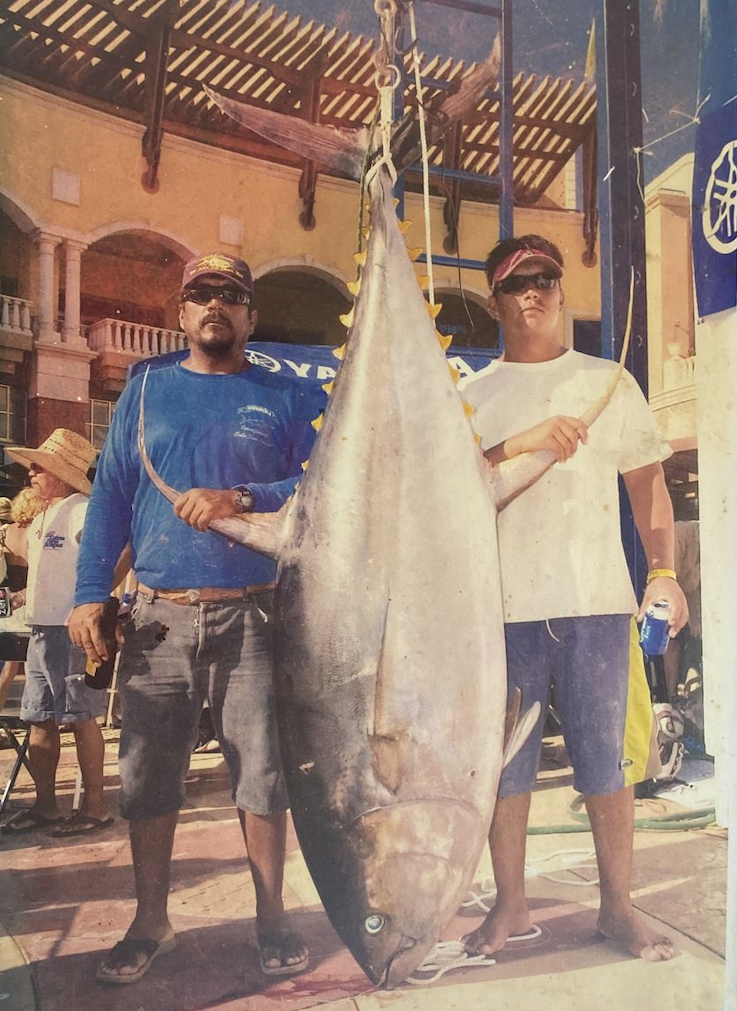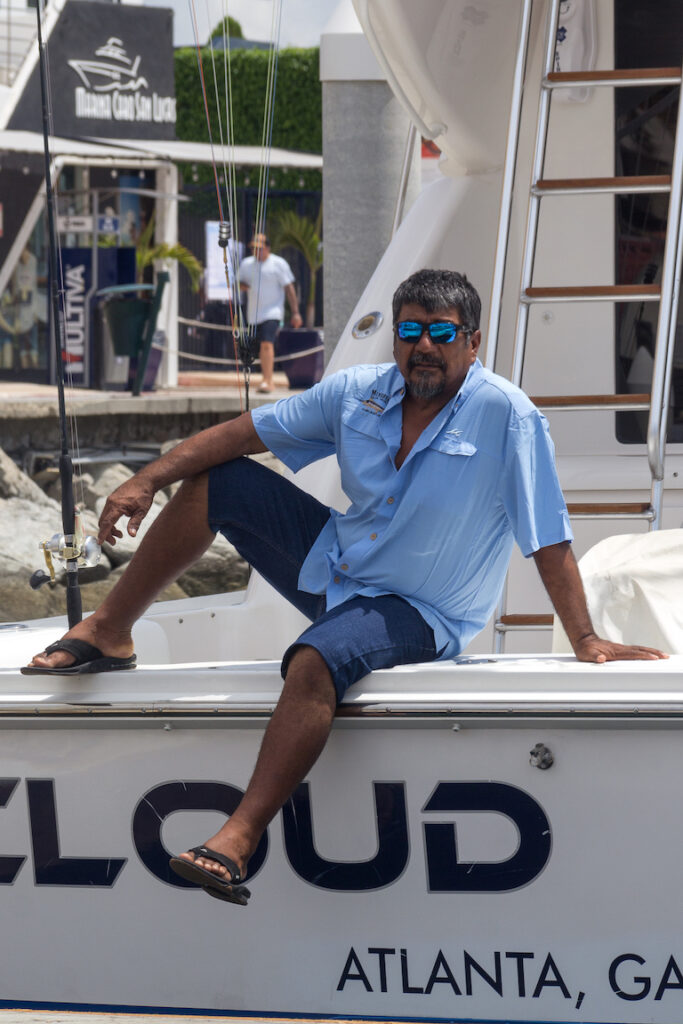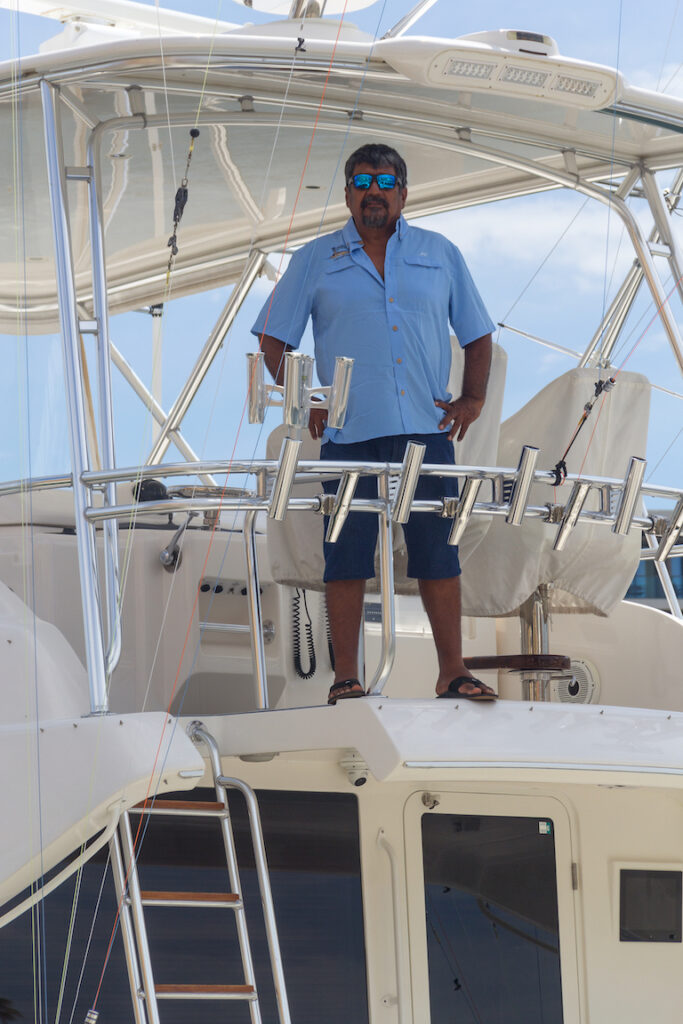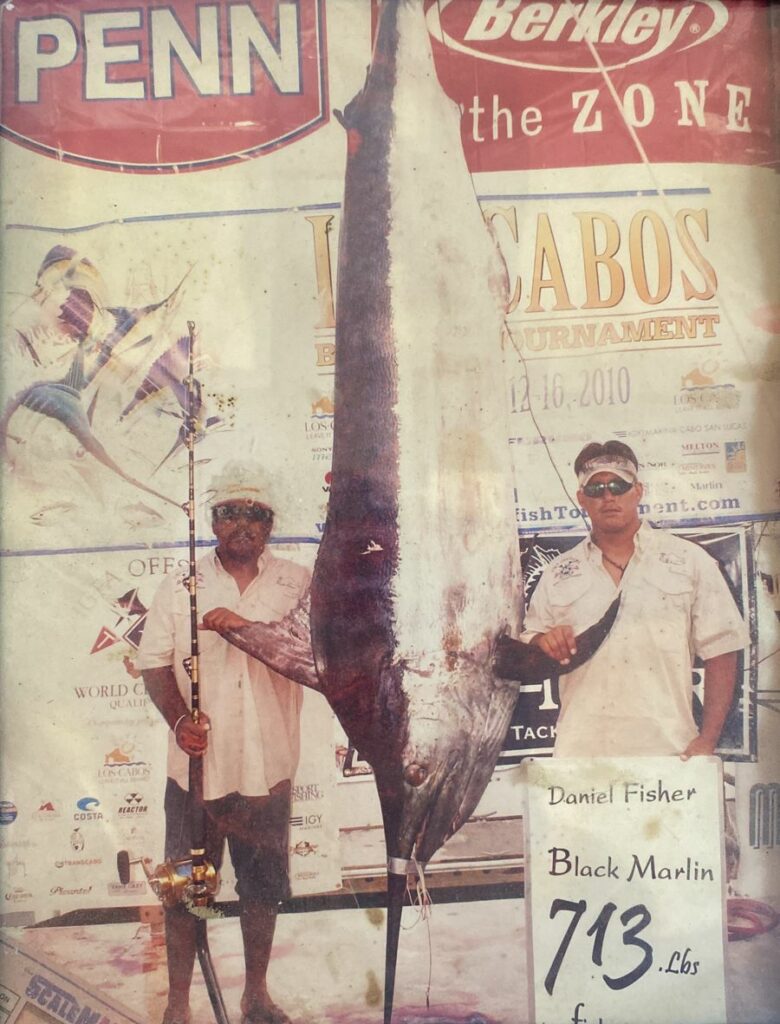BY Minerva Saenz-Smith
CABO SAN LUCAS – Hugo “Picura” Pino Olachea is a man of few words, and you get the sense that he’s taking everything in when he looks at you. He has a strong, husky voice with a seriousness about him. He doesn’t talk or smile much, yet his friendliness breaks right through. Hugo was born number four of six children in San Jose del Cabo in 1965. The tiny pueblo called “La Playa” (“the beach”) was home and comprised of approximately 100 families, all fishermen with family trees full of fishermen and a few ranchers thrown in for good measure.
La Playa is no longer there. In its place is Marina Puerto Los Cabos. Fishing is what everyone knew and what everyone did to make a living. It was even more beautiful than it is right now. Just imagine growing up right on a beautiful tropical beach and living “the village effect,” which most of us only get to hear about. That’s the world our 2023 Local Legend was born into.
Today, Hugo, his wife and three children still live within the boundaries of the old neighborhood. As the village began to spread out to make room for developing and the grand plans of bringing a world class marina to Los Cabos, things changed quickly. Much to the disappointment of the 100 families that once made up their pueblito, the powers that be changed the name, and now it’s called, “Colonia Rincon de la Playa” (Which means “the corner of the beach community”), and the original villagers hate it.
In Hugo’s words, “My childhood was very hard, food was scarce and my older brother had already left to a little colonia called Bajia Santa Rosalilito which was located on the Pacific side of the Baja Peninsula, 660 miles from La Playa where he fished and helped to support us. When I finished eighth grade, I took off to work with him and began my life as a fisherman. There were no questions or objections, it was accepted by me and everyone that if I wasn’t going to continue my education, then I should start my career and help feed the family. It came naturally, I learned fast and I loved it. The problem was, I began to love to drink, too. I met my responsibilities with no objection and so I guess I felt I deserved to do what I wanted to do which was, eat, work, drink and sleep. By the time I was 18, coming in from a day of fishing I was surprised by my older brother who said, “Get your stuff together, we’re going home, this is not good for either of us,” and I didn’t realize how wise he was ‘til much later. So off we go back to La Playa.

When we arrived, my dad’s cousin Francisco Cazesus, who everyone called “Mochenko” informed me that he had just purchased seven pangas and named one Fatima which is the one designated for me to start working on immediately. This later became the first organized panga sportfishing fleet of La Playa. It seems travelers were coming from all over the world to fish the Mexican waters and when they weren’t sportfishing, we could fish and make a good living doing what came naturally, what we loved and what I was becoming really good at!”
By 1991 Hugo had a reputation with everyone inside and outside the Baja fishing world. Clients were asking for him, fishermen had singled him out as “the guide” to put them on the big ones and tournaments were coming to town. Hugo was a huge draw working every day and sometimes doing two fishing trips a day, and the only time for rest was during hurricane season.
In 1991, Daniel Fisher invited Hugo to fish onboard the JUANITA IX in the first Bisbee’s Black and Blue Tournament. This turned out to be nothing but a three-day drunk! Hugo laughs as he recalls this life-changing event. Life changing is exactly what it was, even though they had absolutely no luck, could not even make bait, he knew that tournament fishing was what he was born to do. Fishing the giant billfish and the big cows had already become a focused target for him, and he knew it better than anyone and other fishermen knew it.
In August of 1995, Hugo was taking out an elderly couple for a six-hour fishing trip. The gentleman had caught a very rare white skipjack of about 8 pounds and Hugo said, “Let’s use him for bait.” He rigged the fish and within a few minutes the rod went off and the gentleman reached over and started trying to fight the fish. He lasted about 15 minutes and then told Hugo he could not fish anymore. Hugo took the rod and within minutes a huge blue marlin jumped, and the excited couple cheered him on. He landed the fish, and they towed it to Palmilla to hang and weigh. Everyone began to gather to help drag the giant fish to the scale. Hugo cannot recall how many men it took to drag the fish to the scale, and then they had to proceed to dig a very large hole in order to be able to hoist the fish and keep his bill off the ground to get a proper weight. A huge crowd had gathered and watched the fish tip the scale at 918 pounds.

The biggest, most memorable experience of Hugo’s life took place the first week of September of 1997 and has the makings of a Hollywood movie. On one especially rough morning. Hugo, Daniel Fisher (a very experienced fisherman and friend) and Victor Palacio (a “green” fisherman) had planned a fishing trip onboard Hugo’s 22-foot panga, Alicia II (named after his daughter). Back then, we didn’t receive hurricane warnings and we still had VHF radios in our homes and vehicles. The boys had no idea, that it wasn’t just rough. Hurricane Linda was approaching with a vengeance.
Normally, Hugo would row a skiff out to where his panga was moored then come in and beach the boat to pick up fishermen, but this morning, he told the boys to get in the tiny skiff and row out to the panga with him. The three boys would then board the Alicia II, anchor the little boat to the Alicia II’s anchor and set out from there on their fishing trip, it was now 5:30 a.m. Hugo knew they should head straight out to the Destilladera where he had a long history of success.
Destilladera is one of many banks located within a three-mile radius, 25 to 30 miles from La Playa, but the most famous of all those banks are Destilladera, Iman, Vinorama and San Luis. Once there, they proceeded to make bait and caught two tuna. One was perfect at 15 pounds, and the other was about 40 pounds and would be a great teaser. Hugo figured, he’d put the teaser on his rod and the smaller one on Daniel’s rod.
Hugo quickly rigged both tunas with 16/0 hooks, and they trolled the tunas for 30 minutes until 8:00 a.m. Hugo saw a large spot in the water moving toward the small bait, then turn quickly and hit the big tuna, and in Hugo’s words, “The guest of honor arrived!”

A black marlin hit the bait, Hugo picked up the rod and let it run and within what seemed like seconds the fish did a half-body appearance three meters from the panga with blood gushing from the gills as Victor screamed “Monstro, monstro!”
Hugo being the strong silent type immediately knew he had never seen a bigger fish in the ocean or on a scale in Mexico, and his personal experience, he knew he’d never seen anything like it and he only had an idea of what he was dealing with. If he had to put money on it, he would swear to this day the fish was well over a 1,000 pounds, possibly 1,100. The marlin jumped again, this time fully extended and the fight was on, jumping and pulling the boat for hours, never seeming to lose any strength even after losing so much blood, and the weather was getting worse and worse as they took turns on the rod and reel.
By the time they looked for something to eat in the ice chest, the sandwiches had fallen apart in the melted ice and they were almost out of drinking water. Victor wanted to turn back really bad, but Daniel and Hugo said “no, it’ll be okay.” Hugo recalls it being 6:00 p.m. and they were tired and started to drink the melted water from the melted ice in the ice chest. They continued to take turns and fight the fish and then it was pitch dark and a cold wind began to blow hard, so they took off the panga’s canvas cover and covered themselves with it, and then it began to rain hard.

It was midnight, and the black marlin was still fighting. Shortly after midnight, they saw the lights of a boat in the distance heading west toward home but they had no lights, no GPS and no VHF, and they knew the boat did not see them. The only one with a phone was Daniel, and so far they had not been able to receive a signal. Victor was scared and wanted to cut the line and go home, but just like the marlin, Hugo and Daniel wanted to keep fighting.
They continued to fish and continued to take turns, and then it was 9:00 a.m. and Daniel’s phone miraculously rang and it was Tomas Cantor with a bad connection, but they caught the words, “boat….searching…..family…..” then they lost communication.
Hugo and Daniel agreed to put more drag on the fish, it was Hugo’s turn on the rotation and then, at 2:00 p.m., 28 hours of fighting later, suddenly ended, just like that the line snapped.
Hugo was quiet after recounting that and then looked at me seriously as I asked him, “What did you feel, Hugo?” He said, “I was proud, Minerva, I’m still proud, we stuck with it and the decision to quit was taken out of my hands. I knew we had fought an incredible fight for 28 hours in the middle of the storm and now I needed to address the situation we were in!”
Looking around, he figures they were 50 to 60 miles out from Punta Gorda, it would be a minimum of 3 hours to get home with very little fuel. They had turned off the motor the whole time they fought the marlin. So he turned on the motor, turned the boat toward home in 30 to 40 foot waves and things were very, very serious on the boat. Hugo was constantly checking the fuel tanks and knew the gas was seriously low. Then just like a great movie, they spotted land, followed by La Playa in sight.
Hugo pauses here and then says to me, “another miracle, we were almost there, almost there so I could run the Alicia II onto the beach ,and we ran out of fuel! I was staring at the tanks when I saw a huge wave, that I knew was a blessing from God and pushed us violently all the way in onto the beach where we jumped off the panga as fast as we could and I saw my wife and kids jump out of the car where they had spent the whole stormy night and most of the day waiting to hear something running toward me with tear stains on their faces, sobbing and all talking at once, “we thought you were gone.”
Our local legend doesn’t just make it happen with billfish, Oh no! Hugo entered the first Western Outdoor News CABO TUNA Jackpot in 1999, on a 26-foot Mexican panga built in La Paz and called, The Legend of Cabo (how fitting is the name? This story could not have been better if I had made it up!).
Hugo has fished in 21 of the 24 Cabo Tuna Jackpots, and I asked him how he feels about the tournament, and he said, “The Cabo Tuna (Jackpot) tournament is not just good for me, it’s good for everyone.” Just like the Legend he is, he closed by saying,“ I have to express my gratitude to Daniel Fisher for introducing me to this tournament, supporting and financing me in 1999 and since, and making it possible for me to be a part of this great event, which changed and continues to change my life!”




